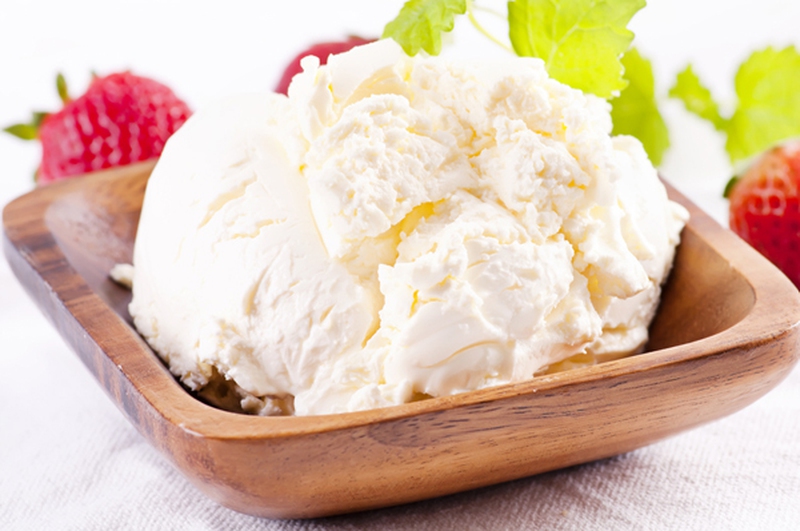Commonly used as a pizza topping and for lasagna and stuffed shells, ricotta cheese is an easily available cheese with a mild yet slightly sweet taste. You can also find it used in many other products, including Italian desserts such as cannoli. Ricotta cheese is made from whey, which is a byproduct of cheeses like provolone and mozzarella. It has a smooth, fluffy texture and can easily be found in supermarkets, in one-pound plastic tubs.
It is possible to make it at home using the whole milk, but before you go any further, it is important to know the answer to, "Is ricotta cheese good for you?" It certainly has benefits, but the question is, "does this mean it has a place in your diet as well?" Let's find out now!

Is Ricotta Cheese Good for You?
Carbs and Protein
People agree ricotta cheese is good due to its protein content. A serving of ricotta cheese provides you with 27.7g of protein as well as 7.5g of carbs. What it means that even a serving can improve your energy levels and give you the strength you need to complete your workouts with good intensity. You will have to sacrifice the amount of protein when you opt for fat-free or part-skim varieties.
Vitamins and Minerals
The presence of vitamins and minerals is one big reason why many people believe you should have ricotta cheese in your diet. You get about 51% of your recommended daily intake of calcium from a serving of ricotta cheese. Part-skim milk is even better, as it offers more calcium. Moreover, you also get about 28% of your recommended daily intake of riboflavin, 39% of phosphorous, 19% of zinc, 22% of vitamin A, and 14% of vitamin B-12 from one serving of ricotta cheese.
Calories and Fat
Is ricotta cheese good for you? Many people do not think so. The main reason is that it packs a serious punch in terms of calories. In fact, you get about 428 calories from a cup of whole milk ricotta cheese. It also contains about 31.9g of fat, and what makes things even worse is that most of the fat is saturated fat that can lead to all sorts of cardiovascular problems. A better alternative would be fat-free or part-skim ricotta varieties – these varieties are healthier but the taste may not be the same as whole-milk ricotta cheese. Fat-free ricotta is a better choice because it contains only 160 calories per cup.
Cholesterol
Just like calories, ricotta cheese is high in cholesterol as well. Keep in mind that you can develop coronary problems if you have high cholesterol in your diet. A cup of ricotta cheese provides you with about 125.5mg of cholesterol. You should not consume more than 300mg of cholesterol per day, which means that you cannot afford to get much of cholesterol from other foods when you have ricotta cheese in your diet. Part-skim ricotta is a relatively better choice since it has 76.3mg of cholesterol, whereas fat-free ricotta offers about 60mg of cholesterol per service.
Sodium
Another consideration when including ricotta cheese in your diet is about its sodium content. It provides you with 206.6mg of sodium. You get even more sodium when you opt for fat-free ricotta, which can have about 600mg of sodium per cup. Keep in mind that you should consume less than 1,500mg of sodium per day to stay healthy.
Other Healthier Cheese Options to Consider
Now you can answer the question "Is ricotta cheese good for you", and you may want to get the benefits opting for healthier cheese options. Here are some alternatives to ricotta cheese:
Cottage Cheese: This un-pressed cheese curd does not have much saturated fat. To get more health benefits, be sure to opt for varieties that do not have high sodium levels.
Quark: With its lower fat and salt content, it is a much better alternative to other types of cheese available in the market. A 100g serving contains about 0.1g of saturated fat but it also provides you with 14g of protein.
Parmegiano Reggiano: This high quality parmesan cheese is one of the best choices because it undergoes stringent testing before it gets to the market. It also has a lower lactose and fat content.
Feta Cheese: Made from sheep or goat's milk, it offers numerous health benefits and is a much better option, especially compared to ricotta cheese.
Halloumi: It is a healthy option because of its low lactose content. Still, a 100g serving provides you with 17g of saturated fat and 3g of sodium.
View All Comments /Add Comment